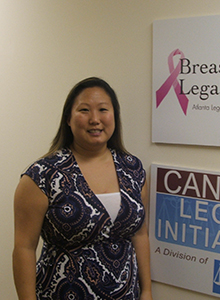Center for Law, Health & Society | News and Events | Center News | 2012 Archive | Graduate Spotlight: At the Intersection of Public Interest and Health Law Graduate Spotlight: At the Intersection of Public Interest and Health Law
Lisa Liang, a 2008 graduate of the College of Law, is working as a staff attorney with the Health Law Unit of Atlanta Legal Aid Society, Inc. During law school, Liang interned for Legal Aid, and she continued volunteering there after graduation until a full-time position became available.
In this position, Liang provides legal services in civil matters to low-income clients with life-threatening illness such as HIV/AIDS or cancer, addressing legal obstacles to improve health outcomes. She also conducts educational presentations for practitioners and communities affected by life-threatening illness to bring awareness and attention to the role of legal services as part of the holistic continuum of care.
"I enjoy the client interaction and making a difference at an exceptionally vulnerable time in someone’s life," Liang said. Liang’s unit at Legal Aid deals with issues spanning from Social Security to third-party custody petitions."For example, providing a person who has a life-threatening illness with estate planning and permanency planning can bring him or her incredible peace of mind, and minimize painful decision making for loved ones," she observed.
Liang has long been interested in working with low-income and disadvantaged populations. Before law school, Liang, who also has a Master of Arts in Teaching, worked as a first-grade teacher in a Title I public school in Chicago. This experience continues to inform and inspire her practice of law. "As a teacher in my community, I was often the most educated and literate person in my children’s parents’ lives," she stated."They asked me to explain public benefits applications, process and denials. I saw the disparate impact on children when services were denied or terminated."
Liang received her undergraduate degree in social work. While working with a pediatric oncology clinic, Liang also observed first-hand the legal barriers, such as access to suitable housing or custodial disputes, that stood in the way of children accessing life-sustaining treatment. Years later, as a law student, she was able to assist clients facing similar health and legal barriers through participation in the HeLP Legal Services Clinic, a live-client clinic at the College of Law, which is part of the Health Law Partnership (HeLP), a collaboration among Legal Aid, Children’s Healthcare of Atlanta and the College of Law.
Liang credited her experience with the HeLP Clinic with helping to develop basic but crucial legal skills she uses regularly in her current position, including interviewing clients, issue spotting through a convoluted story, comprehensible letter writing, and dealing with layers of government bureaucracy. "I would urge law students to take advantage of diverse experiences, especially where you will gain exposure to real-life situations," she said.
In the downturned economy, the last several years have been difficult for Legal Aid and other legal service organizations. Staff attorneys are being asked to help more clients in need with fewer attorneys and resources. Legal Aid has had to redefine priority cases and screen out more cases. They rely heavily on pro bono attorneys to assist.
"In this economy, as more people are living paycheck-to-paycheck, a diagnosis of a life-threatening illness quickly can downgrade a once middle class family to an indigent one with compounding problems like lack of health insurance and resulting delaying or foregoing of life saving care," observed Liang.
Liang praised the efforts of her colleagues in this environment. "I value working at Atlanta Legal Aid Society because of the incredible intellect and ingenuity as well as passion that my colleagues embody. They are creative and zealous in their advocacy, and most importantly they are collaborative."
She also challenged GSU law students and graduates to help those in need of legal services."Remember your obligation to pro bono and public interest service and embrace it," she said.
Stacie P. Kershner, JD
Associate Director, Center for Law, Health & Society